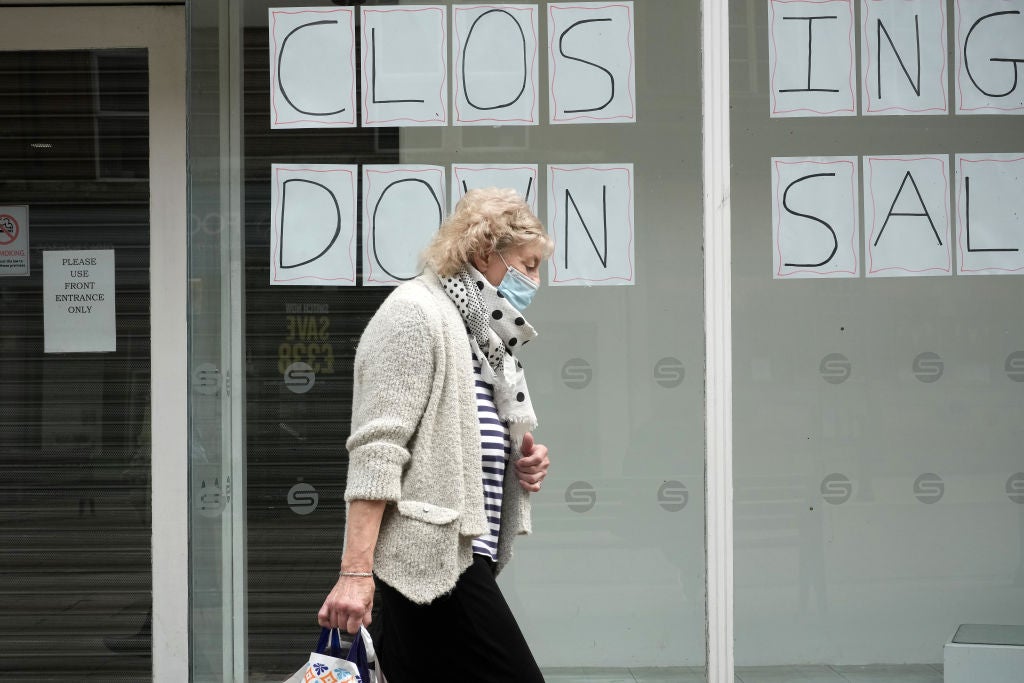Shopping streets are haemorrhaging – the government has to do something about it
This is not just about being able to buy things, the effects of the pandemic on our high streets is about people’s wellbeing, writes Chris Blackhurst


There is nowhere in Wigan for a lady to buy a bra.
Apparently, that’s the complaint often made to Janet Dickinson, who runs Lady Designer Wear, the last women’s boutique in Wigan town centre. “There are ladies coming in here saying they can’t even get a bra.”
It just could be that the bra-wearing women of Wigan could make the difference, and that, finally, the government may wake up to what is occurring on our high streets. Because, heaven knows, so far, they have resolutely ignored the crisis that is unfolding in our land.
Shopping streets, the commercial districts of towns and cities, are haemorrhaging. An anonymous poster went on Mumsnet (the platform beloved of politicians, especially at election time) to say how Wigan has lost “Debenhams, Next, Marks & Spencer, H&M, the Body Shop, its central Post Office, game shops, cafes, all restaurants, health food stores, most pubs, its huge market, several banks, nightclubs, book shops, many charity shops and all its high-end hair salons.” She added: “These have been replaced by pop-up eyebrow/lashes salons, fast food joints, pound shops, phone-unlocking shops, cash converter-type shops, Primark (its only remaining clothes store), Iceland. The rest is boarded up.”
The woman continued: “I can’t understand how it got so bad. Why did everything just die? It was previously so bloody alive”.
The post was quickly commented on more than 400 times, with people sharing woes about high streets up and down the country and calling for action on parking charges, business rates and making internet retailers pay fair taxes.
Cue too, a visit to Wigan by the Daily Mail, and the observation about the difficulty of sourcing a new bra.
The high street was in decline, pre-Covid, thanks to high business rates, lack of free parking, growth in out of town retail parks, and the rise in internet shopping. The pandemic merely speeded up the downward shift.
Another, Covid-related, factor has come into play. Not only did the outbreak force the closure of shops and push people towards buying online, but it also changed work-patterns, making the idea of working from home (WFH) commonly acceptable.
The solution by ministers so far appears to be to throw random amounts of money at the problem – handing out grants to councils deemed to be particularly deserving
Covid restrictions have been lifted for months now, and still, there is no sign of a wholesale return to offices, not en masse, not every day of the working week. There are folks at ground level, but up above in the office buildings, the lights are off and the rooms are empty.
The result is that all those businesses which used to rely on servicing commuters and office workers have vanished. The kiosks on station approaches, sandwich bars, dry cleaners, shoe repairs, shops selling work shoes, shirts, ties and suits – they’ve either gone or as seems most likely, are going.
In the West End of London, the small stores that populated London Underground stations have all but vanished. At Piccadilly Circus station, there was not a single open outlet when I passed through recently. Same in the City, at Bank, where shop after shop, at the station and above ground, on the secondary, side roads, is boarded up. Once they plied their trade from supplying the steady streams heading to and from work, and during breaks from desks. Not anymore. Some days, it can feel like normal but not all and that’s the point – they can’t prosper if two or three days a week the numbers are down.
This week, shares in office landlords took a pasting after an investment bank warned that “real estate’s glory days are numbered”. Analysts at Bank of America cut their earnings forecasts for property companies that specialise in office space by 7 per cent a year for the next 10 years.
The bank based its gloomy tiding on the conclusion that “working from home and hybrid working are here to stay”.
Marc Mozzi, Bank of America’s top European real estate analyst, and his team see no other way but for the values of office blocks to start falling. Over the next two years, they are “conservatively” forecasting a 12 per cent slide in office values.
The solution by ministers so far appears to be to throw random amounts of money at the problem – handing out grants to councils deemed to be particularly deserving in the hope they can improve their retail districts and make them more appealing. But the local authorities do not appear to have much of a clue and are falling back on turning former department stores for example into mixed use, office and apartment blocks.
But it’s all hit and miss, very much based on a wing and a prayer. We require something a lot more concerted and thought-through. Boris Johnson and his colleagues need to wake up, and realise this is happening, right now, in every constituency and the social and mental health fallout will be as critical as anything brought about by Covid.
The same degree of focus and urgency, of joined-up thinking across government departments, across Whitehall and local authorities, that was applied to combating the pandemic, should be practised again. It is that serious. They would be making a grave mistake if they dismissed the lack of availability of bras in Wigan as a trivial matter. It’s indicative of a growing problem, one they should start tackling.
Join our commenting forum
Join thought-provoking conversations, follow other Independent readers and see their replies
Comments



Bookmark popover
Removed from bookmarks